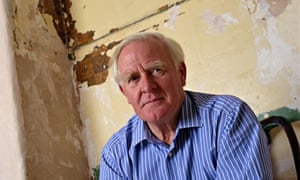 ©Antonio Olmos
©Antonio Olmos
Seamus Heaney photographed in 2008
Aeneid Book VI, by Seamus Heaney, Faber, RRP£14.99, 64 pages
This Lent, among the pre-Easter images of death and regeneration, an offering has appeared from a great poet who has now been dead nearly three years. On its cover is the golden bough, which you have to take with you to gain entry alive into the underworld. The volume is a gift from and for the dead — Seamus Heaney’s posthumously published translation of the central book in Virgil’s epic 12-book poem the Aeneid.
In Book Six, the hero Aeneas has just reached Italy, his promised land. Now he must pause. He must visit Hades, and once there he looks both backward and forward. He sees the shade of his father but also the future, the dynasty he will found at Rome. The book is the link between the new world and the old. It pivots the story from what has passed to what will come. It is a moment of recovery, drawing on but also haunted by everything Aeneas has lost and has managed to bring out safe from the fall of Troy.
When Virgil died in 19BC, he left the Aeneid slightly unfinished. Heaney died in Dublin in 2013 and his translation was also, perhaps, not entirely complete. He might have polished further. But it was in a publishable state. “Final”, he wrote on the last draft. His daughter Catherine has worked on it with his editor, the poet Matthew Hollis. “The decision to publish,” she said, “was one our family took after long and careful consideration. However, given its theme, of Aeneas’s search for his father in the afterlife, it would be hard to think of a more poignant way for us to mark the end of our father’s poetic journey.”
Heaney found inspiration in the dark: from below, in the land he belonged to, and his profound sense of community with ancestors both tribal and literary, from the past, and from his own responsive inwardness. In Station Island (1984), the darkness he set echoing was that of a tough inner pilgrimage on Lough Derg, Donegal. In this collection, shades of the dead ask him what he is doing writing poems while the Troubles tear society apart. But the last shade, James Joyce, is bracing as well as brutal and tells the poet to get on with it, get back in harness, write for the joy of it. “Fill the element/with signatures of your own frequency.” Again, inspiration comes from community, from a literary past but also a lived human past, which blows through the mind enlivening and freeing.It was absolutely the right decision and adds enormously to our understanding of Heaney’s rich oeuvre and the way he used his life in his work. He is a poet of densely woven memory, with a powerful sense of debt to tradition. “If you’re a poet,” he said in one of his wonderfully illuminating essays, “you are called upon to honour the dimensions of the art.” He honoured those dimensions in his essays; he also did it, from the start, in his poems. “Digging”, the first poem of his first collection Death of a Naturalist(1966), values the work of his father and grandfather, “going down and down/For the good turf. Digging”, and draws a parallel between their work on the land and his own work with language. The last poem in that collection, “Personal Helicon”, dedicated to his fellow poet Michael Longley, also addresses the poet’s calling but is concerned not with process but source, with inspiration. It describes the poet’s childhood passion for wells, in the farmland and bogland where he grew up. These wells map mythically on to the fountain on the Muses’ mountain, Helicon. “I rhyme”, ends the poem and the book, “To see myself, to set the darkness echoing.”
In a 2008 interview, Heaney said the motifs of the Aeneid Book Six were always in his head: “The golden bough, Charon’s barge, the quest to meet the shade of the father.” A bit of mythic background to this book helps us understand his choices and aims. Many ancient cultures portrayed dying as a journey to the underworld but the dream of making that journey alive, and coming back, has been potent magic in literature from the ancient Sumerian Epic of Gilgamesh onwards. The ancient Greeks called the motif katabasis, going down. It was such a feature of Greek myth that in 405BC Aristophanes, writing The Frogs after the tragic poet Euripides had died, showed Dionysus, god of tragedy, travelling to Hades to bring Euripides back.
Heaney’s instinct for mapping the mythic on to the personal was very sure, and Book Six, his daughter says, was always a ‘touchstone’ for him
The theme of katabasis was interwoven with images of cave-oracles, learning from the dark, and nekyia, a rite that summoned up the dead so you could learn from them about the future, the past, yourself. In The Odyssey, the hero does not go down but fills a trench with blood so the dead can drink from it and speak. He sees his dead mother, his dead companions, and the seer Teiresias who instructs him how to get home. Some Greek figures such as Heracles and Psyche go down to the underworld as part of a series of imposed trials. Others go to bring the dead back to life, as Orpheus hopes to do. All these resonances echo through the Christian Harrowing of Hell — Christ’s descent into the realm of the dead between the time of his crucifixion and his resurrection. Christ triumphs over Death, Christ becomes the hero who returns alive from the underworld. Virgil, writing 50 years or so before Christ’s crucifixion, used the same resonances of katabasis that Greek Christian writers used around the resurrection. Dante, fusing all these motifs in The Inferno, in the 14th century, took Virgil as his literary model and personal guide into and out of hell.
It is as crucial to understanding Heaney as to understanding Dante, that thekatabasis is not only a descent to the underworld but a descent into yourself, the inner journey every writer has to face. Rilke, in his Sonnets to Orpheus, says you can’t be a poet unless you “have been among the shades/and tuned your lyre there”. Inspiration, says Margaret Atwood, is “a hole that leads downwards”. “There is a ladder,” says Adrienne Rich in her poem “Diving into the Wreck”. “I go down . . . I came to see the damage that was done/and the treasures that prevail.”
Heaney’s instinct for mapping the mythic on to the personal was very sure, and Book Six, his daughter says, was always a “touchstone” for him. He went back to it again and again: this translation is the result of years of work, from the 1980s up to the month before he died. He began thinking of doing a whole translation when his first grandchild was born in 2007, but he had mined Book Six in poems long before, especially after 1986 when his own father died. At the beginning of his collectionSeeing Things (1991), he translated 50 lines from it in a poem called “The Golden Bough” which gave voice to filial grief. “I pray for one look, one face-to-face meeting with my dear father.” In District and Circle (2006), he glimpses his father in his own reflection in the London Underground. In 2010, inHuman Chain, he wrote a sequence called “Route 110,” sparked off by the birth of a granddaughter. Like Virgil in Book Six, he is thinking of descendants as well as ancestors. The new arrival is “one/Whose long wait on the shaded banks has ended/ . . . As her earthlight breaks.” The poem is built round a bus journey but is also a journey into his past, beginning with the poet buying a second-hand copy of Book Six as a teenager. The bookseller is the Sybil, and second-hand clothes on market stalls sway “like their owners’ shades close-packed on Charon’s barge”. The bus inspector, like Charon, “separated and directed everybody”. Passengers scatter as instructed, “like agitated rooks/ Around a rookery”.
In the new translation, this simile reappears as “flocks of birds/Blown inward from the stormy ocean”. Heaney’s translator’s note calls what he has done “neither a ‘version’ nor a crib, more like classics homework, the result of a life-long desire to honour the memory of my Latin teacher, Father Michael McGlinchey.” His teacher “created an inner literalist who still hunts for the main verb of a sentence and still, to the best of his ability, disentangles the subordinate clauses, although usually nowadays with the help of a crib from the Loeb Library”.
That “a” before the “nowhere” is very Heaney. He is faithful to the Latin; he is also being himself. He often alliterates (he was a master of alliteration); and with the alliteration can craftily vary the register, too. When Aeneas sees the gold bough glittering in the forest, Heaney flicks in among Anglo-Saxon words a grander, Latin-based adjective to underline the oddity: “green-leafed yet refulgent with gold/Like mistletoe shining in cold winter woods,/Gripping its tree but not grafted, always in leaf”.The Loeb Library publishes classic texts in parallel translation and occasionally here the Loeb version seems a little near the surface. When Aeneas finds the golden bough, Virgil says Aeneas “avidus refringit”. He breaks it off “avidus”: “eager”, “ardent”. The Loeb has “greedily breaks” and Heaney has followed suit: “greedily tore it off”. Would Virgil have wanted, for his reverent hero, the rather selfish note in English “greedy”? Might Heaney have moved on from the Loeb in a final revision? We will never know. Generally he is beautifully faithful to the Latin rather than the Loeb, and also to his own voice, his “own frequency”. In one famous line, Virgil shows Aeneas and the Sibyl walking towards the entrance to Hades. “Ibant obscuri sola sub nocte per umbram”: literally “They went dark [ie they themselves were dark] through shadow under lonely night.” Eight long syllables, then a shiver (a rustle of fear in the dark perhaps) of three short ones (nocte per), then two longs. The whole sound sums up the steady determination of facing “lonely” darkness, walking to the last place you want to go because it holds something you need. Heaney translates, “On they went then in darkness, through the lonely/ Shadowing night, a nowhere of deserted dwellings.”
In his earlier poem “The Golden Bough”, he translated Virgil into a long English line to represent the Latin’s 14-syllable hexameters. In this version, he recasts it in loose pentameters, generally 11-syllable lines of blank verse, which flow beautifully — especially at the heart of the book, the son’s meeting with his father’s ghost. Aeneas can see and talk to his father but not hug him. “Three times he tried to reach arms round that neck./Three times the form, reached for in vain, escaped/Like a breeze between his hands, a dream on wings.”
Three years after Heaney’s death these lines, and this whole book, remind us of what we lost to the underworld through his early death at 74. The absolute guarantee in that voice. The care for lineation and vowel, the blend of lyric craft with watchful intelligence and deep feeling; the integrity. If only Dionysus could go down and fetch him back.













